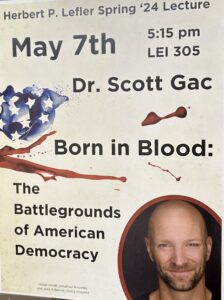A conversation with Professor Gac, Professor of History and American Studies at Trinity College
Mead Fellow Quin McGlame ’25 recently spoke with Professor Gac, Professor of History and American Studies at Trinity College. Professor Gac is the Lefler Lecturer in History at Carleton College in Spring 2024.

Could you share a little bit about yourself? (where you’re from, classes you teach, etc., how you came to Trinity)
I was born and raised on Long Island in New York, attended college and graduate school in New York City, and moved to Connecticut in 2003. First, I lived in New Haven when I held a post-doctoral position and, later, I moved to the greater Hartford area. In 2006, I was invited to teach a summer course in the (now defunct) graduate program in History at Trinity. A little later, I accepted a visiting professorship in History and American Studies and then started the tenure-line position at Trinity that I still hold today.
In my earlier years at Trinity, my courses focused on social protest and culture, especially in and around antislavery in the nineteenth-century United States. Over time, I have developed courses on the History of American Slavery and other offerings that focus on violence and race in the United States. A course on Trinity College and slavery, which was first taught by Trinity History alumnus Alexander Manevitz (‘09) a few years ago, has now become a regular course for me and serves as one of the research arms of the Primus Project. I co-direct the Primus Project with Professor Chris Hager in the English Department.
Could you talk about your most recent publication: Born in Blood: Violence and the Making of America?
Born in Blood is a rethinking of American history from 1750 to 1900. I used an introductory History course, HIST 285 Born in Blood: Violence and the Making of America, to help me develop the ideas found in the book. Slavery, Indigenous colonization, and White supremacy have fostered a tradition of violence in the United States. The book Born in Blood explores how this tradition is located within American political and cultural institutions, from the more concrete, such as the Continental Army and the federal government, to the more abstract, such as American democracy and capitalism. Cambridge University Press released the book in January 2024 and amazing reading groups, such as Philadelphia’s Conduction Advocates, have put it on their lists.
You were invited to participate in Carleton College’s Spring 2024 Lefler Lecture next week titled “Born in Blood: The Battlegrounds of American Democracy”. Could you talk about what this opportunity means for you and what the lecture will discuss?
Yes, I was selected as the Lefler Lecturer in History at Carleton College in Spring 2024. The lecture derived from my book Born in Blood and centered on democracy as a violent practice in the United States from 1790-1860. With an upcoming national election in the fall, I wanted to develop a research talk that would situate in a historical perspective the armed violence we have seen in and around recent elections in the US.
In addition to the lecture, I was required to attend a class session of HIST 298, the historical methods class at Carleton. Students in the class recently read Born in Blood alongside The 1619 Project: A New Origin Story by Nikole Hannah-Jones. The Carleton students analyzed the two works, which offer different approaches but seek to achieve a similar goal: the rewriting of a national history that embraces, rather than ignores, the workings of race and racism in the American past.
In today’s world, why do you believe studying history is important?
History is a fundamental means through which we forge our identities in the present. As such, historical interpretation and understanding is always developing to help us explore, interpret, and understand our lives and ourselves. On a more practical front, we are in a unique moment in which digital media has exploded and the desire for hard-headed, accessible professional histories can be seen across many media platforms. In other words, there is a lot of demand for professionally curated historical content, but not enough professional content creators.
What advice would you give to someone interested in studying history at Trinity?
If you love the study of history, then start reading or listening to an audiobook now. It takes time to develop the advanced analytical and reading skills expected of the top students in History at Trinity. In short, the more you read and engage in historical works outside of your history classes, the easier it will be for you to navigate and understand the books assigned in class.
